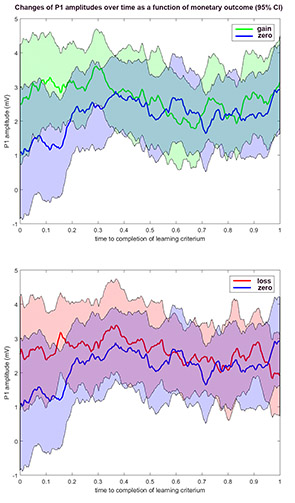Defining novel indicators of implicit reward-related learning in EEG data

Image: Annekathrin Schacht
Which stimuli from our environment we can process massively depends on their relevance, defined by a number of different factors. These factors include not only physical stimulus features (e.g. brightness, contrast, loudness) but also their relevance in a given context. Here, motivational and emotional relevance play a crucial role and determine whether and how we perceive and process stimuli. To allow adaptive behavior, relevance of stimuli can dynamically change through e.g., associative learning mechanisms. In this project, we aimed at identifying neural markers of these changes in high-resolution EEG measures. Based on novel analyses approaches, we could show that increased motivational relevance declines over time, presumably due to attention shifts and predictive coding.

